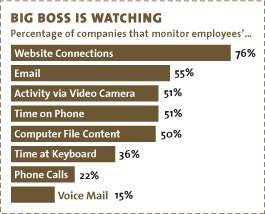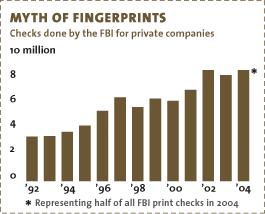There are 15,000 surveillance cameras in Manhattan. iSee, a web application, maps “paths of least surveillance” across it.
In August, NYC spent $212 million to install “intelligent video” cameras in the subway. Meanwhile, riders receive “clear and useful” PA announcements only 16% of the time.
A Londoner is monitored by some 300 cameras a day. A study found that more street cameras lead to a 2% drop in crime, while better streetlights lead to a 20% drop.
Closed-circuit TV operators watch blacks twice as often as whites and monitor 1 in 10 women for “voyeuristic” reasons.
By March, Chicago’s surveillance software will alert police to “suspicious and unusual behavior,” including wandering aimlessly, loitering, and pulling over on a highway.
Manalaplan, Fla., runs background checks on each car and driver that enters it.
In 2003, the Census Bureau gave data on people of Arab descent to Homeland Security. During WWII, census data was used to round up Japanese Americans.
Of 220 college registrars contacted by law enforcement agencies after 9/11, 176 turned over records without informing students. Only 8 campuses refused to release records.
In 2005, the personal data of at least 50 million Americans was lost or stolen.
The FTC reports 10 million victims of identity theft a year. But 63% of “victims” have no out-of-pocket losses, and 64% fix the problem in less than 10 hours.
97% of Americans believe identity theft to be a “very serious” problem. 71% want new laws to protect their privacy on the web.
Found Online: CIA director Porter Goss’ Social Security number (041-30-xxxx).
In an article about privacy, News.com reported easily Googling Google’s CEO’s net worth, political donations, and Burning Man attendance. Google blacklisted News.com reporters for one year.
Google, Yahoo, and MSN have capitulated to China by blocking sites with forbidden words, including “democracy,” “human rights,” and “freedom.”
In 2002, the Defense Dept. began consolidating a database of 12 million potential recruits but didn’t, as required, make its existence public until 2005.
In 2002, a California high school gave hall monitors PDAs to access surveillance and student data. Cisco, Sony, and PacketVideo provided the $50,000 “SkyWitness” system.

The owners of JFX Direct, a leading L.A. paparazzi firm, are former gangbangers.
After a spate of incidents in which JFX and other paparazzi endangered celebrities, the LAPD said it was considering charging publications that hire them with conspiracy.
Los Angeles paid a $387,500 settlement in 2003 after a cop allegedly used LAPD computers to help tabloids track celebrities.
After a hacker posted a sex tape of Fred Durst online, the Limp Bizkit frontman said it was “causing awareness for homeland security. Without those hackers we wouldn’t solve the problems we need to solve.”
Since 2004, the FBI’s backlog of untranslated counterterrorism intelligence has doubled to 8,300 hours of tape.
21% of businesses say employee email and IMs have been subpoenaed. 1 in 5 videotape employees on the sly.
Teen Arrive Alive, a GPS-enabled cell phone, allows parents to pinpoint teens within 10 feet and monitor the direction and speed of any car in which they are traveling.
Checkmate, a semen test kit that enables suspicious spouses to check their better half’s underwear for signs of dangerous liaisons, sells for $49.95.
300 names a day are added to the government’s “no-fly” list, which has included Senator Ted Kennedy, the star of Ozzie and Harriet, and at least 14 infants.
77% of business travelers would gladly allow their background checks, fingerprints, and iris scans to be kept on file if it minimized airport hassle.
In May, the GAO found that less than half of federal and state fugitives are red-flagged in the State Dept.’s passport database.
The State Dept. has delayed plans to embed passports with radio frequency ID (RFID) tags after privacy advocates publicly demonstrated the poorly encrypted chips could be read from 30 feet away.
In July, a 33-pound endangered turtle was seized from poachers after an RFID implant alerted Cambodian game inspectors.
The RFID tags in Parmigiano-Reggiano’s cheese wheels store data about where and when the cheese was made and what the cows had been eating.

In July, former Wisconsin governor and secretary of Health and Human Services Tommy Thompson announced his plan to get an RFID implant.
In 2002, PR firm Fleischman Hillard suggested ways to “neutralize opposition” to RFID technology, including renaming the devices “green tags” and bringing key lawmakers into the “inner circle.”
Some evangelists consider RFID tags to be the biblical sign of the beast and a portent of the Rapture.
Martha Stewart told Vanity Fair she learned how to disable her electronic ankle bracelet on the Internet.

















